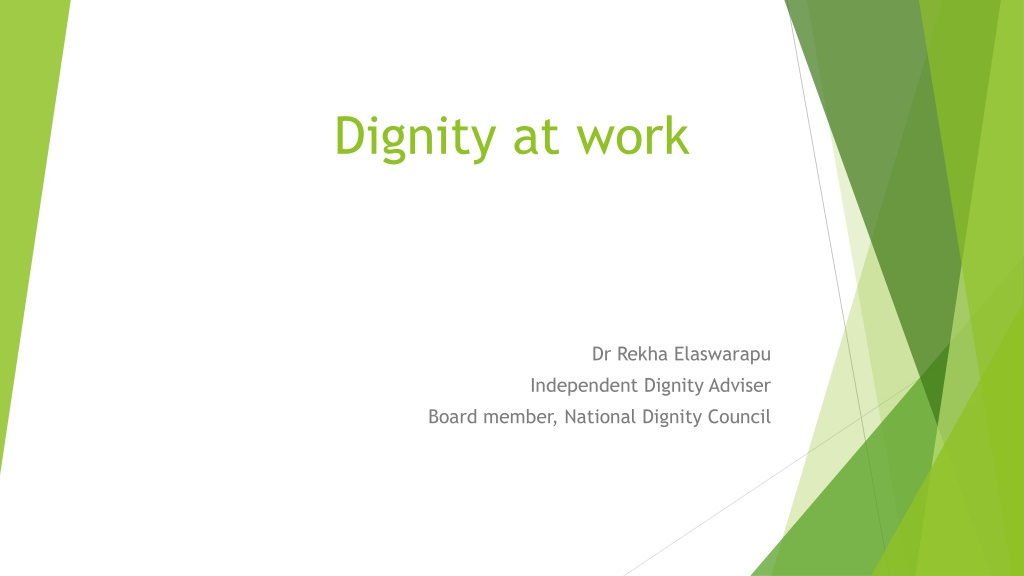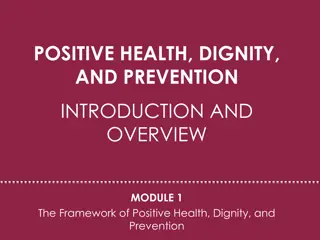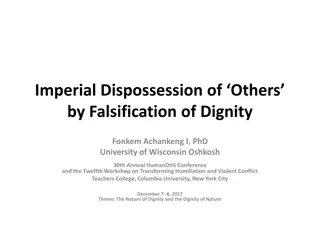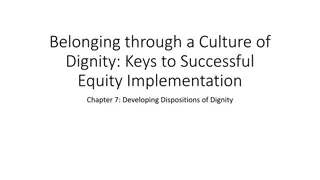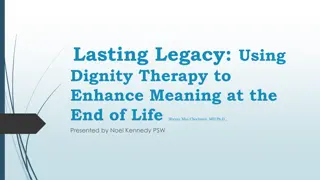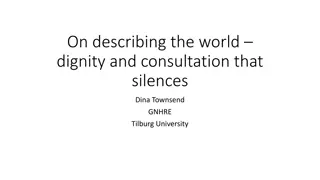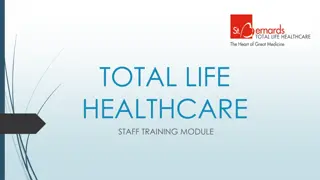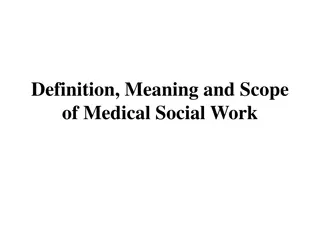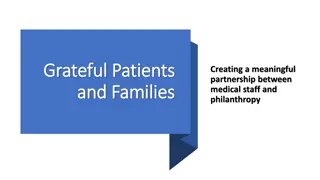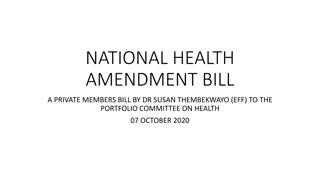Understanding Dignity at Work in Healthcare
Evidence emphasizes the crucial link between treating healthcare staff with dignity and how it influences patient care. The concept of Dignity at Work emphasizes respect for all individuals in the healthcare setting, promoting a culture of compassion and fairness. This approach ensures that everyone interacting with healthcare services is treated with respect and dignity, fostering transparency, openness, and clear communication. Bullying and harassment pose significant threats, impacting mental health and overall well-being, leading to lost productivity and other negative consequences.
Download Presentation

Please find below an Image/Link to download the presentation.
The content on the website is provided AS IS for your information and personal use only. It may not be sold, licensed, or shared on other websites without obtaining consent from the author. Download presentation by click this link. If you encounter any issues during the download, it is possible that the publisher has removed the file from their server.
E N D
Presentation Transcript
Dignity at work Dr Rekha Elaswarapu Independent Dignity Adviser Board member, National Dignity Council
Dignity at work Evidence suggests that if staff are treated with dignity and respect then they would in turn treat patients with dignity, respect and compassion. This has led to the concept of Dignity at Work which protects and enables the staff to be treated with dignity at their workplace.
Dignity at work Every individual who comes into contact with the NHS and organisations providing health services should always be treated with respect and dignity, regardless of whether they are a patient, carer or member of staff. This value seeks to ensure that organisations value and respect different needs, aspirations and priorities, and take them into account when designing and delivering services. The NHS aims to foster a spirit of candour and a culture of humility, openness and honesty, where staff communicate clearly and openly with patients, relatives and carers. (NHS Constitution)
Dignity at work Dignity at work involves ensuring that staff are valued and counted in their work environment. Staff and employers should build a workplace culture that promotes respect for all. No staff member should be subjected to bullying and harassment in any respect.
Bullying The BMA defines bullying as where an individual or group abuses a position of power or authority over another person or persons that leaves the victim(s) feeling hurt, vulnerable, angry, or powerless
Harassment 'It is any behaviour, whether verbal, non-verbal, or physical, which has the purpose or effect of violating an individual s dignity or creating an intimidating, humiliating or offensive environment for that individual or group. NHS Employers- Briefing 74:, The Equality Act 2010
Impact of bullying Workplace bullying can lead to lost productivity, fraud, worker abuse and more. Lack of dignity at work can affect an individual's emotional, psychological and physiological health. These affects can extend to their interaction with family and friends too.
Impact of bullying Mental health Debilitating Anxiety (80%) Panic Attacks (52%) Clinical Depression: new to person or exacerbated condition previously controlled (49%) Post-traumatic Stress (PTSD) from deliberate human-inflicted abuse (30%) Shame (the desired result of humiliating tactics by the bully) - sense of deserving a bad fate Guilt (for having "allowed" the bully to control you) Overwhelming sense of Injustice (Equity - the unfairness of targeting you who works so hard; Procedural - the inadequacy of the employer's response to your complaint)
Impact of bullying - Physical health Cardiovascular Problems: Hypertension (60%) to Strokes, Heart Attacks Adverse Neurological Changes: Neurotransmitter Disruption, Hippocampus and Amygdala atrophy Gastrointestinal: IBD, colitis Immunological Impairment: More frequent infections of greater severity Auto-immune disorders Fibromyalgia (21%), Chronic Fatigue Syndrome (33%) Diabetes (10%) Skin Disorders (17%)
Stress related problems resulting from bullying or harassment sickness absence erratic or poor timekeeping increases in patient complaints increase in number of employees taking counselling increase in grievances poor working relationships conflict between colleagues Source: RCN: Bullying and harassment at work a guide for RCN managers and negotiators
Impact of bullying Economic harm Lost skills due to people leaving jobs Forced to transfer from loved job, often a punitive transfer (13%) Constructively discharged without reasonable cause (24%) Lost productivity due to stress related sickness
NHS staff survey 2014 Sixty-five percent of staff reported that they had attended work in the previous three months despite not feeling well enough to perform duties Of those who had attended work while unwell, 91% stated that they had put themselves under pressure to attend; 30% felt under pressure from their manager and 23% from other colleagues to attend. Thirty-nine percent of NHS staff reported that during the last 12 months they have felt unwell as a result of work related stress. Around 3% of all staff said they had experienced physical violence from other staff. Twenty-four percent of staff reported they had experienced bullying, harassment or abuse from either their line manager or other colleagues. Two thirds (66%) of incidents of physical violence and 44% of bullying, harassment or abuse cases were reported
Dignity at work policies: ACAS guidance (1) statement of commitment from senior management acknowledgement that bullying and harassment are problems for the organisation clear statement that bullying and harassment is unlawful, will not be tolerated and that decisions should not be taken on the basis or whether someone submitted to or rejected a particular instance of harassment examples of unacceptable behaviour statement that bullying and harassment may be treated as disciplinary offences the steps the organisation takes to prevent bullying and harassment
Dignity at work policies: ACAS guidance (2) responsibilities of supervisors and managers confidentiality for any complainant reference to grievance procedures (formal and informal), including timescales for action investigation procedures, including timescales for action reference to disciplinary procedures, including timescales for action counselling and support availability training for managers protection from victimisation how the policy is to be implemented, reviewed and monitored.
Overarching themes integral to the effective function of an organisation particularly for ensuring dignity at work for staff Culture Leadership Accessibility of the policy Handling of concerns Support for staff during and after the investigation Training
Key success factors for ensuring a bullying free culture Acknowledge bullying and harassment culture exists Respond quickly Don t be defensive Be open
Effective leadership Lead by example Lead from the front Non-negotiable values Practice the values and behaviours Create a staff friendly culture Set the standards and ensure its adherence at all times Robust governance framework Good communication including minding the tone Give feedback professionally Value your staff
Dignity is everyones business Thank you for listening Dr Rekha Elaswarapu Independent Dignity Adviser Board member, National Dignity Council rekha_elaswarapu@yahoo.co.uk
